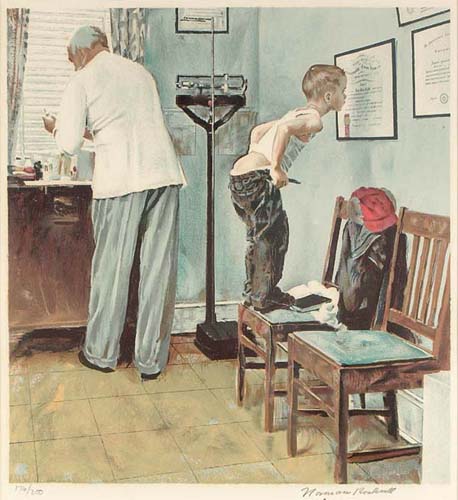Pediatric Immunizations: Still Needed, Safe?
After writing yesterday’s article about the new 2013 immunization guidelines I started looking for images in my photo-file of a child with Mumps or Measles. I did find one with measles and even Rubella, but not for mumps. So, I looked on the internet to see if there was one in the public domain that I could use because I’m beginning to realize that these days it’s getting harder to find someone who has actually seen these diseases.
I did find a site from a woman who was so far off the mark that it border-lined on what I told you about the Wakefield debacle yesterday; only this one had no access to a legitimate journal–only the internet. We all should be smart enough to recognize self-interest and propaganda so prevalent on the internet; but, unfortunately, gullibility seems to be on the rise as life gets more complicated in general.
This woman claimed that her children’s eczema was obviously due to them having a baby shot three days before; and, besides, her chiropractor and neighbors had told her so. They had even given her information about supplements she could buy which would treat it (of course there’s no ulterior motive there). Then she even went further and was attempting to let the whole world know what a terrible scam the entire medical profession was perpetuating with their immunization scheme. (No accounting for foolishness)
As absolutely ludicrous as this woman is, the effects of this kind of “treatment bashing” not only grates on legitimate physician’s nerves but causes needless anxiety in legitimate parents trying to do the right thing. Legitimate physicians have no issue with parents voicing concerns and asking questions. A fact that was demonstrated in a published American Journal of Preventive Medicine article (2011).
In that study 79% of physicians say they have an immunization refusal by parents at least once a month. Eight percent report refusals on up to 10% of children per month. I’m more inclined to believe the first figure but I’m sure it depends upon how many actual children you see each month and where you practice in the country. Concerns are mostly about long-term complications in general and autism in particular.
 Three-fourths of physicians, the report stated, believe the parents are acting responsibly when they question whether a child should receive immunizations and about two-thirds claim they don’t feel disrespected when parents disregard their recommendations. However, in spite of that, fourty-four percent require (always or often) parents to sign a waiver form if they decline vaccination. Some even go so far as to dismiss patients from their practice – a bit foolish and short-sighted if you ask me.
Three-fourths of physicians, the report stated, believe the parents are acting responsibly when they question whether a child should receive immunizations and about two-thirds claim they don’t feel disrespected when parents disregard their recommendations. However, in spite of that, fourty-four percent require (always or often) parents to sign a waiver form if they decline vaccination. Some even go so far as to dismiss patients from their practice – a bit foolish and short-sighted if you ask me.
I have to say that in most physician’s experience, spending some time to give legitimate data and background information about the severity of the diseases involved is enough to convince most concerned parents of their propriety. The most persuasive argument, according to the survey, is personal — the physician would vaccinate his or her own children. The next best argument is pointing out how vaccines have proven safe for other patients in the practice.
Just this month (Jan 2013) a report on a truly massive review of the scientific medical literature supported not only the safety but the efficacy of the new childhood immunization schedules, even if, on first glance, they appear a bit “too much and too early” to some. The Institute of Medicine (IOM) reviewed all of the current literature and heard from stakeholders before issuing their report.
“Upon reviewing stakeholder concerns and scientific literature regarding the entire childhood immunization schedule, the IOM committee finds no evidence that the schedule is unsafe,” the 14 expert authors wrote in the report [Childhood Immunization Schedule and Safety: Stakeholder Concerns, Scientific Evidence, and Future Studies. National Academies Press. Published online January 16, 2013.]
“Indeed, rather than exposing children to harm, following the complete childhood immunization schedule is strongly associated with reducing vaccine-preventable diseases,” the report continues. In specific, the extensive review found no evidence of associations with: autoimmune diseases, asthma, hypersensitivity, seizures, pediatric developmental disorders, learning disorders or developmental disorders, or attention deficit or disruptive behavior disorders.
In fact there developed an important consensus between the varied representatives in the group consisting of healthcare providers, parents, and public health officials.
And, for a second time, the conversation has digressed from my intended explanation of the new 2013 guidelines; but, tomorrow – I promise. If you’d like to read about mumps in greater detail, here is a good article.
12 Posts in Immunizations (immunizationSafety) Series
- The vaccine strategy (video) – 20 Jun 2017
- 10 reasons parents choose not to immunize – 6 Jun 2017
- Immunization v. Vaccination: Vaccine-Hater Cottage Industry – 31 May 2017
- Immunization v. Vaccination: How we got in this mess – 27 May 2017
- Vaccine-preventable diseases coming back – 30 Apr 2017
- Return of Measles Disease – 22 Jun 2015
- Decision not to immunize nearly killed their son – 11 Jun 2015
- Measles Outbreak in unvaccinated – 18 May 2014
- Autism and Immunization Link Debunked... Again – 30 Mar 2013
- Immunization Safety Research – 30 Jan 2013
- Wakefield Immunization Fraud – 29 Jan 2013
- Immunization Safety Series: Intro/Index – 28 Jan 2012

